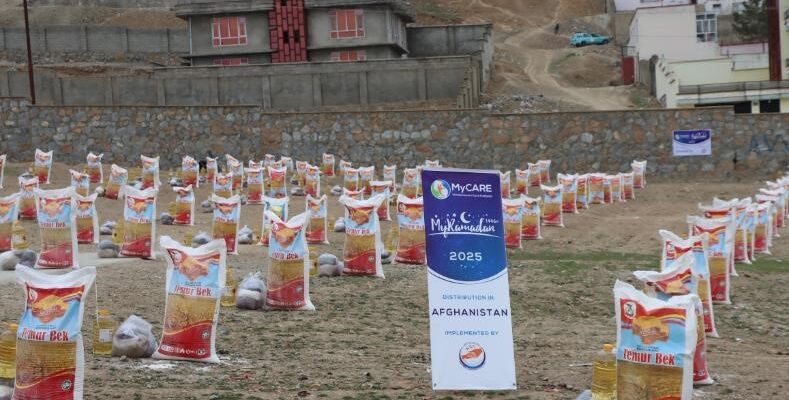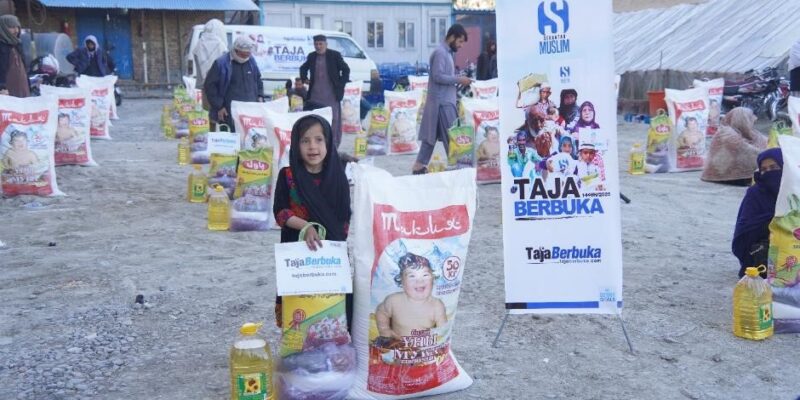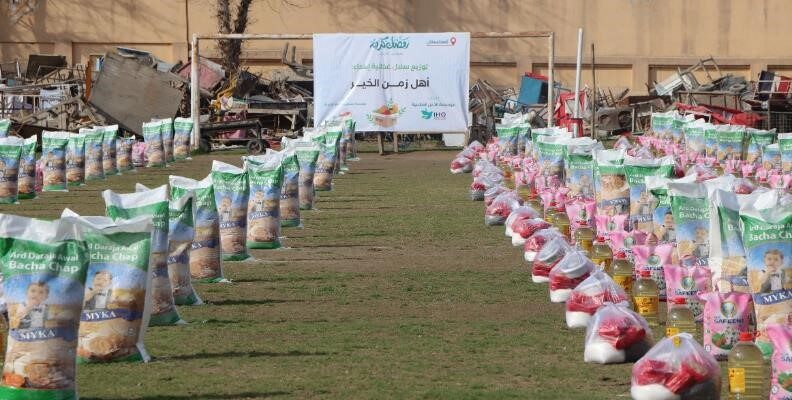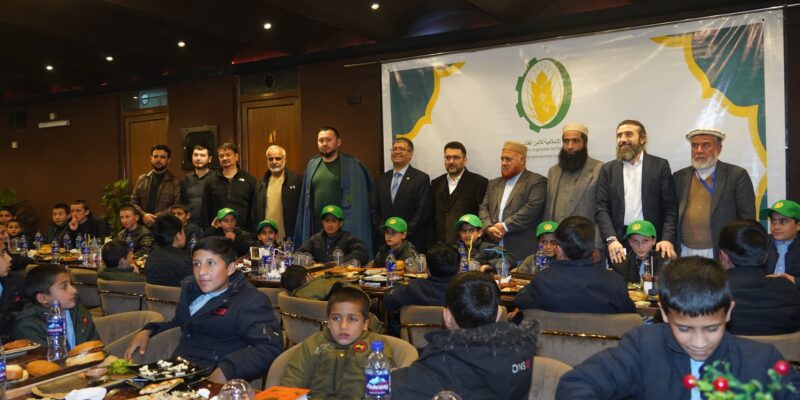Project Overview: Ramadan is the month of mercy, forgiveness, and salvation from the fire of…

Food Packages Distribution to 200 Households in Logar Province
Project Overview:
Ramadan is the month of mercy, forgiveness, and salvation from the fire of hell. In alignment with the teachings of the Prophet Mohammad (PBUH), it is essential to earn this reward by contributing financially to help the poor, orphans, and widows. In this spirit, Ehsas Welfare and Social Services Organization (EWSSO), with the generous support of the My Care Malaysia, distributed 200 uncooked food packages in Kabul Province, Afghanistan, on March/24th/2025. The donation aimed to support low-income households, providing essential food supplies to alleviate hunger and economic hardship.
Achievements:
- Direct Impact: Successfully distributed food packages to 200 low-income households, directly benefiting around 1,400 individuals, including orphans and widows.
- Community Support: Fostered a sense of community support and solidarity, reinforcing the importance of aiding those in need during challenging times.
- Operational Efficiency: Despite significant obstacles, our team managed to complete the project within the planned timeframe, showcasing our commitment and resilience.
Project Contributions:
- Effective Resource Allocation:
- By targeting the most vulnerable populations, the project ensured that resources were efficiently allocated to those in dire need, maximizing the impact of the aid provided.
- The careful selection and distribution process ensured that the aid reached the intended beneficiaries without significant delays or losses.
- 2. Increased Awareness and Support:
- The visible impact of the project has increased awareness about the critical issues facing low-income households in Afghanistan, attracting further support and collaboration from other organizations and stakeholders.
- The support from My Care Malaysia and the successful implementation of the project have set a precedent for future initiatives, encouraging more partnerships and funding opportunities.
In summary, the food package distribution project has significantly improved the lives of the target groups by providing essential nutrition, reducing economic stress, and fostering a sense of community support. The project’s success under challenging conditions has also strengthened EWSSO’s operational capabilities and increased awareness of the ongoing needs in Afghanistan.
Beneficiary Feedback
Feedback Collection:
We gathered feedback from beneficiaries and stakeholders through direct interviews, surveys, and community meetings. This approach allowed us to obtain a comprehensive understanding of the impact of our food package distribution project in the month of Ramadan to identify areas for improvement.
Positive Feedback:
- Beneficiaries: Many beneficiaries expressed deep gratitude for the timely assistance, highlighting how the food packages significantly improved their nutritional intake and alleviated financial pressures. One recipient mentioned, “The food package helped us survive through the most difficult times. We are very thankful for the support.
- Community Leaders: Local community leaders praised the project for its efficient distribution process and the positive impact on the most vulnerable households. They acknowledged the improved well-being of the community members who received the aid.
Reflections and Lessons Learned
Share key insights gained during the grant period and how you plan to apply this knowledge, such as improving service delivery and stakeholder coordination.
Key Insights:
- Resilience in Adversity:
- The experience of navigating severe flooding and bureaucratic delays highlighted the resilience and dedication of our team. This project reaffirmed the importance of being adaptable and prepared for unexpected challenges.
- Effective Communication:
- Clear and consistent communication with beneficiaries and stakeholders proved crucial. Gathering and addressing feedback helped us understand the immediate needs and adjust our strategies accordingly.
- Government Relations:
- The project underscored the necessity of improving our coordination with government agencies to minimize delays and interference. Establishing stronger relationships and clearer communication channels with governmental bodies is essential.
Lessons Learned and Future Applications:
1. Improving Service Delivery:
- Enhanced Logistics: We plan to develop more robust logistical frameworks, including contingency plans for natural disasters, to ensure timely delivery of aid.
- Feedback Mechanisms: Continuous engagement with beneficiaries through regular feedback sessions will be implemented to keep our services responsive and effective.
2. Strengthening Stakeholder Coordination:
- Government Coordination: We will work on building better collaboration with government agencies to streamline project approvals and reduce bureaucratic obstacles.
- Community Involvement: Increasing community involvement in project planning and execution will help us better understand local needs and improve the impact of our initiatives.
3. Capacity Building:
- Investing in training for our team on disaster preparedness and management will enhance our ability to respond swiftly and efficiently in future emergencies.
By applying these insights, we aim to improve our service delivery, enhance stakeholder coordination, and build a more resilient and effective organization to better serve the Afghan people in future projects.
Future Activities
To continue and expand upon the work funded by My Care Malaysia we have outlined several future activities aimed at providing ongoing support and development for affected communities in Afghanistan. Our plans are designed to ensure sustainability and resilience, regardless of whether we receive further funding from My Care Malaysia.
1. Securing Additional Funds:
- Objective: Identify and secure additional donors to fund the construction of homes for families who lost their houses due to floods and other disasters.
- Action Plan: Develop comprehensive project proposals highlighting the urgent need for housing and the positive impact on community stability. Engage in networking and outreach to international aid organizations, NGOs, and philanthropic foundations.
2. Implementing Sustainable Projects:
- Objective: Attract donors to fund sustainable projects in flood-affected areas, such as infrastructure development, agriculture support, and income-generating initiatives.
- Action Plan: Present detailed project plans that emphasize long-term benefits and community resilience. Focus on projects that can provide ongoing economic opportunities and improve living conditions.
3. Expanding Food Security Programs:
- Objective: Continue and expand food distribution programs to reach more vulnerable households, ensuring food security and improved nutrition.
- Action Plan: Develop partnerships with local and international food aid organizations. Explore opportunities for community-based agriculture projects to promote self-sufficiency.
4. Enhancing Disaster Preparedness:
- Objective: Strengthen our disaster preparedness and response capabilities to better support communities during natural disasters.
- Action Plan: Provide training for our team on disaster response and management. Develop and implement comprehensive emergency response plans, including stockpiling essential supplies and establishing rapid deployment teams.
5. Building Community Resilience:
- Objective: Implement programs that build community resilience, such as education and vocational training, health services, and psychosocial support.
- Action Plan: Partner with educational institutions and healthcare providers to deliver training and services. Develop community centers that offer a range of support services and resources.
6. Improving Stakeholder Engagement:
- Objective: Foster stronger relationships with government agencies, local leaders, and community organizations to improve project coordination and effectiveness.
- Action Plan: Establish regular communication channels and collaborative forums to engage stakeholders in project planning and implementation. Advocate for supportive policies and streamlined procedures to facilitate aid delivery.
7. Monitoring and Evaluation:
- Objective: Implement robust monitoring and evaluation mechanisms to assess the impact of our projects and ensure continuous improvement.
- Action Plan: Develop key performance indicators and feedback mechanisms. Conduct regular assessments and reports to track progress and identify areas for enhancement.
By pursuing these future activities, we aim to build on the success of our current projects, enhance community resilience, and ensure sustainable development for the people of Afghanistan. Our commitment to supporting vulnerable populations will drive us to seek out new opportunities and partnerships, regardless of future funding from My Care Malaysia.
Project Outcomes:
Ehsas Welfare and Social Services Organization (EWSSO) distributed food packages to 200 low-income households, which helped around 1,400 individuals. The total 200 uncooked food packages have 13.38 tons of weight.
Contents/items of the distributed food packages in Kabul
| weight | Item | No. | |
| 50 kg | Flour | 1 | |
| 5 lit | Cooking Oil | 2 | |
| 2.5 kg | Sugar | 3 | |
| 1 kg | Date | 4 | |
| 5 kg | Rice | 5 | |
| 1 Kg | Tea | 6 | |
| 2.5 Kg | Bean | 7 | |
| A total of 300 packages (13.38 tons)
|
|||
EWSSO urges all philanthropists in Afghanistan and abroad not to leave their fellow human beings alone in these difficult times.
Beneficiary & Project location Overview
| Households | Weight (Tone) | Locations | # |
| 200 | 13.38 | Logar | 1 |
| 200 | 13.38 | Total | |
Following is the list of beneficiary households and individuals, who benefitted from this project:
| Indirect Beneficiaries #of Individuals |
Direct Beneficiaries #of H.H |
Total Households |
| 610 | 155 | Male |
| 790 | 45 | Female |
| 1400 | 200 | Total (Beneficiaries) |




This Post Has 0 Comments